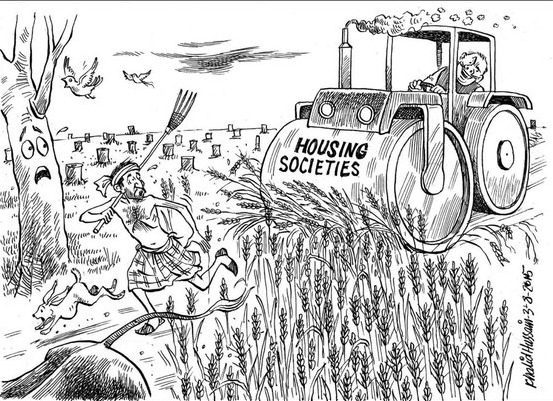About Us
Contact Us
Advertise With Us
Disclaimer
Privacy Policy
Terms & Conditions
Copyright © 2024 - BoldDiscussions.com

Pakistan's cities are a whirlwind of activity. Towering cranes pierce the sky, laying the foundation for gleaming new apartment buildings. Billboards plastered across bustling streets advertise the latest gated communities, promising idyllic suburban life. This surge in housing development is a sign of progress, a nation striving to meet the needs of its growing urban population. But beneath the shiny veneer lies a hidden cost: the gradual disappearance of Pakistan's precious agricultural land.
For decades, land acquisition for real estate projects has been a free-for-all. Developers have swooped in, purchasing vast swathes of land and transforming fertile fields into concrete jungles. While this approach has fueled economic growth, it has also raised concerns about long-term sustainability. Pakistan, after all, is an agrarian nation. Its fertile plains and valleys have nurtured generations, providing food security and a vital source of income for millions of farmers.
The rapid conversion of farmland into housing estates threatens this delicate balance. As fields vanish under a layer of bricks and mortar, the ability to produce food domestically diminishes. This pushes Pakistan towards an uncomfortable dependence on food imports, exposing the nation to price fluctuations and potential supply chain disruptions.
Enter the Supreme Court of Pakistan, a beacon of hope in this complex scenario. A recent case involving land acquisition for a housing society in Rawalpindi has brought the issue of agricultural land conversion into sharp focus. The court, led by the esteemed Chief Justice Qazi Faez Isa, expressed shock at the "flagrant violations" surrounding the project's land acquisition process, which apparently involved the conversion of agricultural land for real estate purposes.
This case has sparked a national conversation, prompting a closer look at the often murky world of land acquisition. Here's where the plot thickens. The process itself can be a labyrinth. Ideally, developers should acquire land through legitimate channels, negotiating fair prices with landowners or government agencies that might possess suitable plots. However, the allure of profit sometimes leads to shortcuts. Some developers might resort to pressuring landowners into selling at lower prices, or even engaging in dubious land transfer practices.
The average Pakistani, eager to secure a piece of the real estate boom, often falls victim to these practices. Developers launch marketing blitzes, promising dream homes and showcasing idyllic lifestyles. Invested in the vision, people readily purchase plots, unaware that the land might not even be legally acquired or fully developed. This leaves them in a precarious situation, their dreams hanging in the balance.
Court cases become all too common in such scenarios. Frustrated investors who haven't received their promised plots face off against developers accused of shady land deals. The land itself becomes a pawn in a legal tug-of-war, its future uncertain. In the worst-case scenario, even government departments struggle to reclaim their land from developers who have built structures on it.
The Supreme Court's intervention in the Rawalpindi case offers a glimmer of hope. The court's eight critical questions delve deep into the heart of the issue:
The answers to these questions hold the key to Pakistan's future. While a comprehensive legal framework might be the ideal solution, the Supreme Court's landmark case could set a crucial precedent. In the absence of a specific law, future real estate projects on agricultural land could be challenged in court, forcing developers to justify their actions and address the concerns laid out by the court.
Disclaimer.
This article provides information only and should not be construed as advice. It is provided without warranty of any kind. Also please note that content on this platform may be subject to copyrighted material. If you believe we have used your content in any way then please get in touch with us. We will take down your content immediately.
Share This Post





BOLDDISCUSSIONS
We Produce Content That informs, Educates And Entertains People Around The World to stay updated on every topic with confidence.
Copyright © 2024 – BoldDiscussions.com

